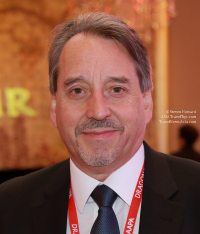|
More than 850 aviation safety professionals
representing regulatory authorities and air transport industry
stakeholders participated at the International Civil Aviation
Organization (ICAO) Second High-Level Safety Conference
(HLSC2015), held from 2 to 5
February 2015 in Montreal, Canada.
The objective of the conference
was to provide the international civil aviation community the
opportunity to build consensus, obtain commitments and formulate
recommendations deemed necessary for the effective and efficient
progress of key aviation safety activities.
The conference covered three major
themes: reviewing the current situation, the future approach to
managing aviation safety and facilitating increased regional
cooperation. In particular, the conference focused on emerging
safety issues, including: the global tracking of aircraft, risks
to civil aviation arising from conflict zones and the protection
of safety information.
 |
|
Andrew Herdman
|
Speaking at the ICAO HLSC2015, Mr. Andrew Herdman, Director General of the
Association of Asia Pacific Airlines (AAPA) said, "The ICAO High
Level Safety Conference has brought together all the key
stakeholders, with senior level representation from government
regulators, and industry associations representing airlines,
aerospace suppliers, airports, and air navigation service
providers. The conference has clearly demonstrated the commitment
of the global aviation community to continue working together to
further enhance safety performance, and reached agreement on a
number of important new initiatives to address emerging issues. As
industry we are keen to move ahead with these efforts, working
with governments to translate these commitments into action."
Among the challenging issues discussed, Mr.
Herdman specifically welcomed the proposed adoption of a new ICAO
standard on global aircraft tracking, noting that such a standard
would be "performance-based, non-prescriptive and not technology
limiting, meaning that global airlines would be able to meet it
effectively using a range of available technologies and
appropriate operating procedures developed in conjunction with
other relevant service providers."
On the issue of risks to civil aviation arising
from conflict zones, Mr. Herdman said, "Comprehensive safety
management systems require timely and accurate information to
support effective risk assessments in the face of evolving
circumstances. We support the proposal by ICAO to develop a centralised repository of both factual information and evaluations
of potential threats to help support comprehensive risk
assessments by operators and other industry stakeholders as
necessary."
Mr. Herdman concluded, "Flying has a well
established reputation for safe operations, and is the safest mode
of travel, with a track record of continuous improvement.
Nevertheless, there is never any room for complacency, every
accident brings loss and human suffering. We are therefore fully
committed to further strengthening of the system of regulatory
oversight. Demand for air travel is growing rapidly across the
Asia Pacific region, and the quality and consistency of safety
oversight needs to be strengthened accordingly. Governments need
to demonstrate greater efforts towards full compliance with
globally agreed ICAO standards and recommended practices,
supported through the joint efforts of the region's operators,
working in close partnership with regulators and other involved
stakeholders."
ICAO,
AAPA,
Security,
Tracking,
Montreal,
Canada
|
